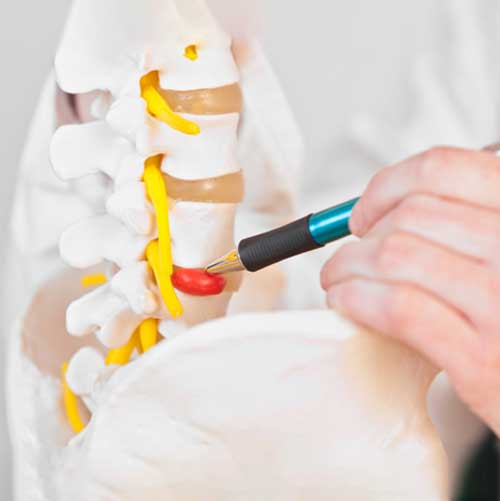How Do I Know If I Have A Herniated Disc?

A herniated disc can be a debilitating condition that affects your quality of life. It occurs when the cushion-like disc between the vertebrae in your spine ruptures, and the inner jelly-like substance leaks out, pressing against the spinal nerves. The result is often unbearable pain and discomfort that can last for months or even years. Here are the signs and symptoms of a herniated disc, and how they are treated by Carrollwood chiropractor – Dr. Jacob Goldberg at Redefine Your Spine.
What does life with a healthy spine feel like?
A healthy spine feels supple, strong, and flexible, devoid of any discomfort or pain. When your spine is in good health, you’re able to move freely and perform daily tasks without any restrictions or stiffness. Good spinal health also contributes to your overall posture, ensuring you can stand tall and straight. Sudden movements or lifting heavy objects do not cause twinges of pain or discomfort. Furthermore, a healthy spine supports a good night’s sleep without any unease or restlessness due to spinal discomfort. Regular exercise, a balanced diet, and proper posture help maintain a healthy spine.
What does living with a herniated disc feel like?
Living with a herniated disc can significantly hinder your daily activities. The pain can be chronic and severe, making simple tasks like bending over or lifting objects an arduous challenge. The discomfort may extend to your legs, causing a tingling sensation or numbness. It can make maintaining a seated position for a prolonged period, such as working at a desk or driving, extremely uncomfortable. Even standing or walking can induce acute pain in some people. Sleep patterns may also be disrupted due to the persistent pain. In essence, a herniated disc may drastically alter your lifestyle, limiting your mobility, and impinging on your overall quality of life.
What are the signs and symptoms of a herniated disc?
Back Pain –
The most common symptom of a herniated disc is severe pain in the affected area, which can radiate down to the legs or arms. This pain may be sharp or dull and is often worse when you move, stand, or sit in a certain position. It can also be accompanied by tingling, numbness, or muscle weakness.
Limited Mobility –
Another sign of a herniated disc is limited mobility in the affected area. You may find it difficult to bend, twist, or turn your back without experiencing pain. Sometimes the pain can be so intense that you may experience a loss of range of motion altogether.
Muscle Weakness –
Depending on the location of your herniated disc, you may also experience muscle weakness in your arms, legs, hands, or feet. This can make it difficult to lift or hold objects, walk, or even stand up straight.
Shooting Pain –
A herniated disc can cause shooting pain that radiates down your legs or arms. This pain can be intense and difficult to manage, and may even cause you to change your posture to avoid the pain.
Numbness and Tingling –
You may also experience numbness and tingling in your arms, legs, hands, or feet if you have a herniated disc. This is caused by the pressure placed on the spinal nerves, which can affect the sensation in these areas.
What can cause a herniated disc?
A herniated disc can result from a variety of injuries or incidents. Often, it is the result of wear and tear on the spine, also known as disc degeneration. As we age, our discs lose some of their water content, making them less flexible and more prone to tearing or rupturing with a minor strain or twist.
However, certain physical activities or incidents can also lead to a herniated disc. Heavy lifting, especially when it involves twisting or turning the spine, can cause a disc to rupture. Other high-impact activities, such as running or jumping, can also put undue pressure on the spine, leading to a herniated disc. Falls or accidents that result in a blow to the back can cause a disc to herniate as well.
Furthermore, occupations or hobbies that require repetitive lifting, bending, or twisting can increase the risk of developing a herniated disc. It’s also worth noting that individuals with a sedentary lifestyle, particularly those who sit for long periods, may be at higher risk.
Lastly, factors such as obesity, which puts extra stress on the discs in the lower back, and genetics, as some people inherit a predisposition to developing a herniated disc, can also contribute to this condition.
Herniated Disc treatment in Carrollwood, FL
If you are experiencing any of these signs and symptoms, it’s important to seek treatment as soon as possible to avoid further damage to your spine and nervous system. At Redefine Your Spine, chiropractor Dr. Jacob Goldberg uses a variety of powerful modalities to treat herniated discs, depending on each individual’s unique needs. He may use Chiropractic BioPhysics®, palpation, exercises, or recommend additional therapies to help relieve your pain and restore your mobility. Don’t let a herniated disc hold you back – contact Redefine Your Spine today for a consultation and start your journey towards healing and wellness.
Suffering from pain and discomfort?
Call Today: 813-563-7600
Redefine Your Spine
11012 N Dale Mabry Hwy
Suite 304
Tampa, FL 33618
| Monday | 8 AM - 6 PM |
| Tuesday | 2 PM - 6 PM |
| Wednesday | 10 AM - 6 PM |
| Thursday | 8 AM - 6 PM |
| Friday | 8 AM - 3 PM |
| Saturday | Closed |
| Sunday | Closed |
